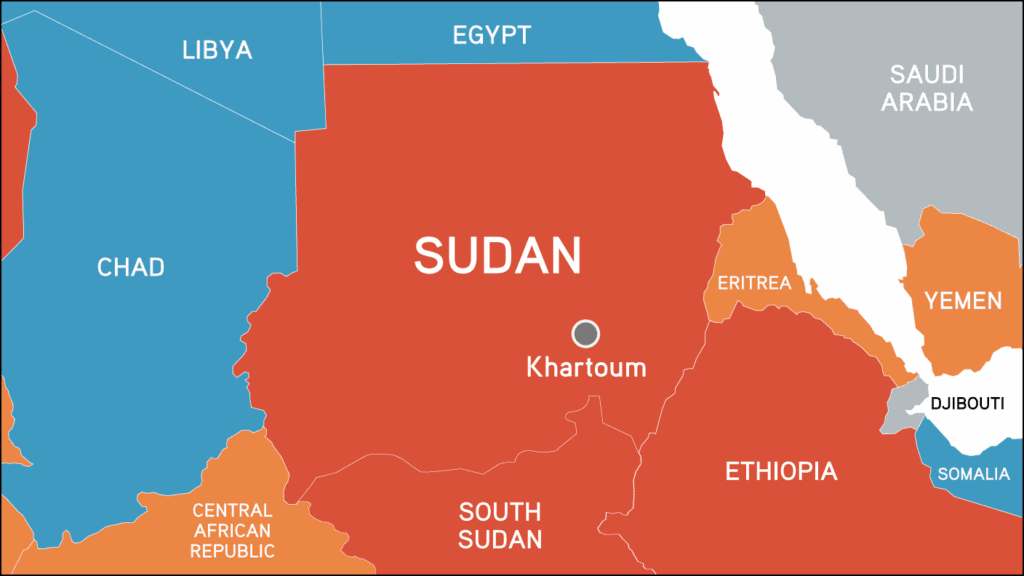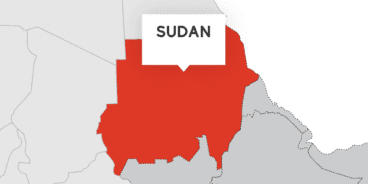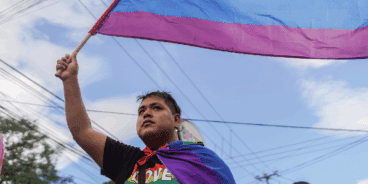Sudan

Populations in Sudan are enduring war crimes and crimes against humanity due to an armed confrontation between the Sudanese military, the paramilitary Rapid Support Forces (RSF) and allied militias. Non-Arab communities in Darfur are enduring crimes that may amount to acts of genocide perpetrated by the RSF.
BACKGROUND:
Since violent clashes broke out on 15 April 2023 between the Sudanese Armed Forces (SAF) and the paramilitary Rapid Support Forces (RSF), both parties have engaged in a fight to preserve and expand control in Sudan. The conflict has been characterized by indiscriminate and deliberate attacks against civilians and civilian objects, often with rocket shells, bombardments and heavy artillery, including in densely populated areas, and the widespread use of sexual violence, including rape, sexual assault, exploitation and sexual slavery. The UN Human Rights Council-mandated Fact-Finding Mission has concluded that the SAF and RSF, and their allied militias, are responsible for large-scale violations of human rights and International Humanitarian Law (IHL), many of which amount to war crimes and/or crimes against humanity. As of September 2024, the World Health Organization reported that the conflict claimed over 20,000 lives, though this figure is likely an underestimate.
The RSF have utilized the conflict to accelerate a systematic campaign of ethnic cleansing and large-scale attacks targeting non-Arab communities in Darfur and other regions, perpetrating possible acts of genocide. RSF forces have expanded their control over almost all of Darfur, and dozens of cities, towns and villages have been fully or partially destroyed. For over a year, the RSF have been consolidating territorial control around El Fasher, the capital of North Darfur and last major city in the region outside their control, blocking crucial supply routes and intensifying attacks on surrounding areas. Since 12 April 2025 the RSF have controlled Zamzam camp, southwest of El Fasher, where they are reportedly committing widespread human rights abuses and forcibly displacing hundreds of thousands of residents.
The ongoing conflict has severely restricted access to lifesaving aid and essential services due to targeted attacks and looting of humanitarian supplies. The conflict has triggered the world’s largest hunger crisis, with 30.4 million people facing acute hunger. During August 2024 the Integrated Food Security Phase Classification Famine Review Committee determined that famine is ongoing in Zamzam camp, with similar conditions likely present in other sites around El Fasher. The UN Office for the Coordination of Humanitarian Affairs reports that over 12 million people are currently displaced, including 3.9 million who have fled to neighboring countries.
Sudan underwent multiple significant political changes after former President Omar al-Bashir was overthrown amid countrywide protests in 2019. Leadership was initially handed over to a joint civilian-military transitional Sovereign Council until the military – under the leadership of General Abdel Fattah al-Burhan and supported by Mohamed Hamdan “Hemedti” Dagalo – seized power on 25 October 2021. The latest conflict was sparked by mounting tensions between General Burhan, commander of the SAF, and General Hemedti, commander of the RSF, regarding the integration of the RSF into Sudan’s regular forces as part of a political agreement aiming to establish a new transitional civilian authority.
RECENT DEVELOPMENTS:
On 20 March the RSF claimed control of Al-Malha, a town approximately 200 kilometers northeast of El Fasher, displacing around 15,000 households and killing at least 45 civilians. This was followed by a devastating RSF assault on Zamzam between 10 and 15 April, in which more than 400 civilians were killed, including 20 children and 12 aid workers, and at least 64 women and girls were reportedly abducted or forcibly disappeared.
Shelling of civilian areas – including markets, camps and residential neighborhoods – has continued unabated. In late April at least 41 people were killed in El Fasher alone, and the violence persisted into May, with shelling claiming 179 additional lives and at least 12 others dying from hunger. During early June the RSF perpetrated renewed artillery strikes on Abu Shouk camp, resulting in the deaths of at least 20 people.
In early May the RSF launched a series of drone attacks on Port Sudan, a crucial hub for international aid delivery, targeting Kassala Airport, Osman Digna Airbase, container terminals and fuel depots. Airstrikes have also resumed. On 31 May an SAF airstrike on a market in Koma killed at least 89 people, marking a resurgence of aerial attacks following a pause in April. On 5 June a humanitarian convoy en route to El Fasher was struck near Koma, killing five aid workers and injuring several others. A week prior, the RSF reportedly shelled a World Food Programme compound in El Fasher.
The RSF have also further expanded the geographic scope of its attacks on the civilian population into North Kordofan. Since 12 July the RSF have reportedly carried out a series of deadly attacks on villages around the city of Bara in North Kordofan, killing over 450 civilians. In one village alone, Shag Alnom, over 200 people were killed by gunfire or arson, while additional raids claimed dozens more lives in surrounding areas, including Hilat Hamid.
ANALYSIS:
General Burhan and General Hemedti have consistently obstructed Sudan’s political transition to preserve and expand their power and privileges. Both continue to recruit forces along ethnic lines and strengthen relationships with regional powers, including several Gulf states.
While a ceasefire between the SAF and RSF is vital, it will not end the RSF’s ongoing identity-based violence. For decades, the Arab-dominated government imposed its control on ethnic minorities and exploited ethnic divisions, with armed Arab militias like the Janjaweed (the RSF’s forerunner) fueling deadly competition for resources and pastoral land. Civilians in Darfur, particularly non-Arab communities and those affected by the current violence in El Fasher, are at risk of ethnic cleansing and genocide given the region’s genocidal history, entrenched impunity for past crimes and ongoing ethnically charged violence.
Impunity has allowed those responsible for atrocity crimes and grave human rights violations to remain in leadership positions. During his dictatorship, former President Bashir, government officials and militia leaders were allegedly responsible for crimes against humanity, war crimes and acts of genocide, for which they were indicted by the International Criminal Court following a 2005 UNSC referral. As a commander of the Janjaweed, General Hemedti was also implicated in atrocities committed during the conflict in Darfur and beyond.
This eastward extension of the conflict to Port Sudan marks a dangerous escalation which threatens to further destabilize the region and intensify Sudan’s already devastating humanitarian crisis.
RISK ASSESSMENT:
-
-
- Escalating humanitarian and human rights catastrophes driven by intense armed conflict, with widespread violence in densely populated areas.
- Deliberate targeting of civilians based on their ethnicity, which may amount to ethnic cleansing and genocide.
- Past or present serious discriminatory practices, policies or legislation against marginalized communities and persons belonging to minority groups, some of which may amount to crimes against humanity and acts of genocide.
- Complete absence of meaningful reconciliation, accountability or transitional justice mechanisms, leaving victims and survivors without redress and enabling impunity for perpetrators of atrocity crimes.
- Sustained external interference through the provision of arms, financial, logistical, training or other forms of support by external actors, including states, private companies and other actors.
-
NECESSARY ACTION:
Generals Burhan and Hemedti must agree to a permanent cessation of hostilities and all forces under their command must adhere to International Human Rights Law and IHL. The international community, including the UNSC, African Union and UN member states, must use diplomatic channels, far-reaching sanctions and public condemnation to pressure the SAF, RSF and allied militias to immediately cease hostilities. The UNSC must urgently consider adopting a strong resolution with effective measures to protect civilians and prevent further escalation, including expanding the sanctions regime to target those responsible for conflict-related sexual violence, ethnic-based attacks and other atrocities.
Alongside ceasefire negotiations, the international community must rigorously assess the risk of further atrocities by identifying communities at imminent risk and coordinating timely, context-specific responses. Given the fragmented nature of the conflict in Sudan, prevention and protection strategies must be tailored to local needs and vulnerabilities. This requires detailed mapping to identify hotspots and assess where risks are most acute. The UN and member states must develop a comprehensive protection plan that addresses the humanitarian and protection needs of civilians, particularly women, children, internally displaced persons and minorities.
International donors must utilize more innovative and flexible ways for aid delivery across Sudan, including support for civilian-run Emergency Response Rooms, neighborhood communities and the disbursement of cash grants to empower local communities.
A comprehensive and inclusive political dialogue involving all relevant stakeholders, including civil society and marginalized groups, must be facilitated to address the root causes of the conflict and lay the groundwork for lasting peace.
For more on the Global Centre’s advocacy work on the situation in Sudan, see our Sudan country advocacy page.
Atrocity Alert No. 443: Sudan, Israel and the Occupied Palestinian Territory and United States Travel Ban
Related Content

Sudan: Extend the mandate of the Fact-Finding Mission for two more years

Intersectionality and Atrocity Crimes: Reflecting on the Experiences of Youth in Atrocity Situations
